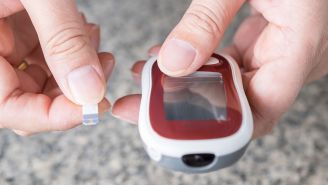6 foods that won't cause your blood sugar to spike
People living with type 2 diabetes can eat these foods with confidence.
Updated on October 28, 2025

If you have type 2 diabetes, what you eat plays a big role in your blood sugar, or glucose levels. A rise in blood sugar after eating is normal. A large spike, however, can lead to hyperglycemia, or high blood glucose, which can have serious health implications.
The biggest factor in whether blood sugar spikes is the total number of carbs in your meal. But it also depends on the meal’s glycemic index (GI), which measures how quickly those carbs hit your system. If you choose foods low on the index, with a low glycemic load (or carbs per serving), it can help reduce spikes in blood sugar.
Here are a few low-glycemic foods people with type 2 diabetes can enjoy.

Start with a protein
Consider building your meal around fish, chicken, or eggs. These carb-free proteins don’t even register on the glycemic index and won’t cause a spike in blood sugar. The same is true for steak and prime rib, but it’s best to limit these options because people with diabetes have an increased risk of heart disease. Many cuts of beef and pork are high in saturated fat, which can contribute to cholesterol and heart issues.

Snack on nuts and nut butters
Nuts, such as almonds, walnuts, cashews, and peanuts, are another healthy protein choice that won’t spike your blood sugar. They also provide heart-healthy fat that can help to lower your low-density lipoprotein (LDL or “bad”) cholesterol and reduce your risk of heart disease. Don’t forget nut butters, which offer many of the same health perks in spreadable form.
Keep in mind, however: While the benefits of nuts are clear, they’re also quite high in calories. Eat them in moderation. Aim for a 1.5-ounce serving of whole, unsalted nuts each day, or 2 tablespoons of nut butter.

Serve up leafy greens
You can eat almost unlimited amounts of dark leafy greens such as kale, collards, chard, and spinach, assured that your glucose levels won’t spike. What’s more, these veggies are low in fat and carbs, and rich in nutrients your body needs. Kale and spinach, for example, are full of vitamins A, C, and K. Many other leafy greens are good sources of B vitamins and folate.

Have some grapefruit
Craving a touch of tartness? Try some grapefruit. Anything with a glycemic load below 10 is considered low, and grapefruit has a load of just 3. One note of warning, however: If you are on medications for diabetes, check with your healthcare provider before adding grapefruit to your regular menu. It’s known to alter the effectiveness of certain drugs.

Snack on hummus
For a tasty, filling, and healthy snack, pair hummus with raw, low-glycemic vegetables such as carrots, cucumbers, and celery. Hummus is low on the glycemic index and carries no glycemic load at all. Plus, chickpeas are a protein- and fiber-rich.

Pop some popcorn
While popcorn has a mid-range score on the glycemic index (55), its glycemic load is low (7). That means with a bit of care, popcorn can be a healthy snack. Make it at home using an air popper if you have one or make it on the stovetop with a minimal amount of oil. Some light microwave popcorn brands will also work. Skip movie popcorn altogether, since it’s very high in saturated fat and calories.
About 1 cup of popcorn contains fewer than 5 carbohydrates. If 1 cup isn’t enough, 3 cups is still a reasonable choice, containing 10 to 20 grams of carbohydrates.

American Diabetes Association. Hyperglycemia (High Blood Glucose). October 28, 2025.
American Diabetes Association. Protein Foods for Diabetes. October 28, 2025.
National Academy of Sports Medicine. Low & High Glycemic Foods: Glycemic Index and Load Explained. October 28, 2025.
American Heart Association. Saturated Fat. August 23, 2024.
USDA.gov. Dark Green Leafy Vegetables. September 11, 2023.
American Diabetes Association. Non-starchy Vegetables for Blood Glucose Control. October 28, 2025.
Diabetes Canada. Glycemic Index Food Guide. 2023.
Johns Hopkins Medicine. Grapefruit Benefits. October 28, 2025.
Harvard Health Publishing. Glycemic Index for 60+ Foods. April 16, 2024.
Featured Content

slideshow

article

slideshow

article
